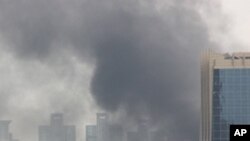Recent unrest in Bangkok and elsewhere in Thailand could have the effect of ruining the start of an economic rebound.
Despite government economic figures released on Monday showing the Thai economy grew at 3.8 percent in the first quarter of this year -- its fatest pace in 15 years, the government and economists are worried the impact of last week's riots will be a second quarter retraction.
The Thai economy is heavily dependent of foreign direct investment and tourism. It has been a center of the automobile and pharmaceutical industries in Asia.
"I think you'll see substantial fallbacks in all of those and a substantially reduced potential growth rate," says Witold Henisz, Associate Professor of Management at the University of Pennsylvania's Wharton School of Business in Philadelphia.
"I'm deeply worried for a country whose economic progress over past ten or twenty years is really at risk,"
Henisz says.
The Wharton professor says he felt "a sense of hope for the country, that it had turned the corner." But of the impact of last week's riots, Henisz adds "I guess it shows the fragility of democratic institutions."
Other Worrisome Signs
The government's National Economic and Social Development Board says the recent unrest will slow household spending and private investment, and cause delays in government spending.
Foreign capital could also be fleeing the stock markets. Thai stocks were down 2.4 percent Monday despite gains in most other Asian markets. Experts agree that continued unrest in Thailand would be a setback in the country's race for international investment.
An Economy Dependent On Tourism
With its advertized scenes of white sand beaches and its modern capitol city, Thailand has been an attractive destination for tourists for some time. And it is tourism that stands to be hurt the most by the recent unrest, according to John Brandon, Director of the International Relations program for the Asia Foundation.
Hotels in Bangkok report occupancy rates are down dramatically and cancellations are continuing as people are still wary of coming to the city.
Tourism represents six percent of Thailand's gross domestic product and the largest earner of foreign exchange for the nation. "A lot of jobs in Thailand are dependent on people coming and visiting from the United States and other nations around the world," says Brandon.
Last week, the Tourism Council of Thailand projected losses of at least three billion dollars this year for the Thai tourism Industry. It projects no more than 13 million visitors in 2010, compared with more than 14 million last year.
Even Thailand's popular Phuket area is hurting. Workers say the unrest may prove to be more damaging to tourism there than the 2004 tsunami that wrecked the resort's coastline.




